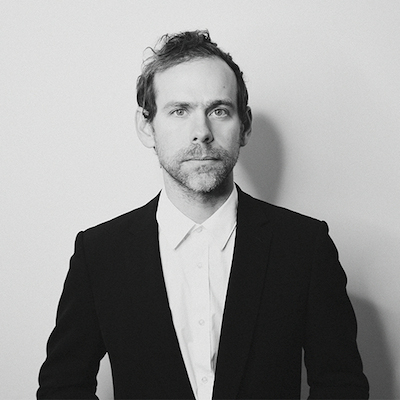
Released on September 11, 2003
HWY-004
CD, Digital
Purchase Album
Featured Collaborators
Songs
- No. 6
- Who's Down Now
- Turtle Soup
- Scratched by the Briar Patch
- No. 4
- Swarms
- No. 1
- Gentler We
- Lullaby for Sue
- No. 3
- Limp Waltz
Notes
LISTEN TO "SWARM" OFF LULLABY FOR SUE
Clogs are four classical musicians hailing from Australia and the United States. The Wire celebrated their first record's "eerie, looping folk melodies, delicately bowed and struck strings, [and] beautiful 'lost at sea' effect." Their second is more rhythmic, ambient, electric, and eclectic. Think stars in a wide-open sky; gnarled NYC attic guitars; desert violins; medieval bassoons; junkyard metal as percussion. Clogs have been compared to artists as diverse as Arvo Part, Sigur Ros, and Godspeed You Black Emperor! The Philadelphia City Paper writes that "few new CDs in any genre will do as much to challenge the way you listen to music."
Padma Newsome interviewed by French journalist Richard Robert from Les Inrockuptibles at time of Lullaby for Sue release:
Q: Do you think that your music has to do with a kind of "new chamber music" which would not rely to a specific genre? Do you feel like it has a connection with the tradition of classical chamber music? Do you feel part of a lineage, a family? Or do you feel like orphans or hybrids?
A: I'm glad that it is difficult to pigeon-hole. As a writer I am more involved with the process of developing material and its potentials than I am with making decisions about style or genre. I have played traditional and non-traditional ensemble music for many years, and have as great a love for Palestrina and Brahms as I do for the Velvet Underground, Pink Floyd, Ligeti, or John Cage, for that matter. I think new music is breathed out of the old and that the old has life breathed into it by the new.
Q: Do you consider that the four of you have common backgrounds? What was your musical ambition when you started to play together? What was your association based on?
A: We have a common place we all inhabited for 2 years - university. Before that we were all doing different things. Bryce was a rock musician from an early age, based in Cincinnati; Thom has played fusion and with large percussion extravaganzas up in Michigan; Rachael did jazz in Vermont as a teenager; and being the old gentleman of the group, I have a cluster of musical lives pre-Clogs: Indian music, symphony orchestras, weird childhood choral extravaganzas, and fringe Adelaide experimental chamber rock.
Q: Most of the pieces are composed by Padma: does it mean that you're the natural leader? How do you work together?
A: A band sometimes works better with a focus member to filter thoughts through, a decisive voice. My main challenge is to keep things moving, and not to get too self-involved. I do write and arrange most of the music, but regardless of the composer of the music, each Clogs member makes music above, beyond, and around the original idea.
Q: How did you come to this original line-up: guitar, violin/viola,bassoon and percussion? Was it consciously planned?
A: In 1999, I had a dream about a band called "Loose Fitting Clogs," a musical shoe with a lot of foot room. I was looking for people with a classical training; that is, the ability to play almost anything you put in front of them, with a classical sense of ensemble playing, BUT who were also improvisers and had rough un-tethered edges.
Q: Your music seems to reflect eclectic and open musical tastes, but it's more than just a blend of various musical influences. Is it a kind of alchemic process? Is it purely subconscious?
A: Idea is waiting, and then smell, and then a quick splash. Writing is that plus the thinking, feeling, and the self-reflective.
Q: Critics who write articles about your music often use the word "minimalist." I'd rather use the word "maximalist": you seem to consider music as whole melodies, harmonies, rhythms, duration, sound, silence, spaces.
A: Being a classical head, "maximalist" is a derogatory term we sometimes used about the music of Ferneyhough, and his total notational hegemony. You should check out his scores. They are monsters but I think I know what you're getting at. I try and write music that is about itself, each piece part of the whole, and that aspect gets built into a dramatic organicism. At the same time, I love surprise, and dislike bridges, especially ones that are not well-constructed. That means sometimes I will just bloody well go on to the next idea, and not try and artifice the transition.
Recently, I have penned the term "micro-minimalism", and that implies for me the kind of musical behaviour which is fascinated with phasing, rhythmical mutation, and pulsing, but without the overindulgence in repetition. Much of minimalists attributes can be found in a blend of African and Balinese rhythms, fused with Ars Nova, 14th century isorhythmical techniques of Machaut and Phillipe de Vitry. There is nothing new under the sun, but the light and shade changes, and sometimes time will stretch a quiet, perfect moment.
Q: What's the part of improvisation in your live performances? What's the purpose of improvisation?
A: Improvisation is the space between the soul and the music, the distance between a bow and a string. It is the heart of music, whether completely notated or improvised. I see no difference between the two.
Q: French musicians who play unclassifiable instrumental music (like Man, Sylvain Chauveaus) come up against strong difficulties, just because the labels, the radio programmers, the promoters, the press and the audience don't know how to categorise them. Do you sometimes have the same kind of problems in the USA and outside of your country?
A: Its my favourite compliment!
Q: People who listen to rock seem to appreciate your music: how do you
explain that? Do you think that the musical areas are less segmented than before?
A: There is rock there in the beat and in the repeated patterns. Both Bryce and I play in a rock band and understand the allure of the honest emotion, but unlike rock we are more likely to change an idea second time around, because of the issue of changing light.
Q: Do you feel like you're isolated in the American musical landscape? Do you have affinities with other artists, in the USA or outside of the USA? Are there other groups which raise the same kind of musical and aesthetic issues?
A: Aloneness or loneliness? I don't mind the former, as long as I can be busy and play with excellent musicians. This is really a Bryce question, since I sit in my room a lot of the time, in isolation, trying to open internal channels. Bryce lives more in the real world, and yes it is difficult, on the one hand we are not rock musicians, neither are we concert-hall, downtown, leather-jacket minimalists. I don't really like smoke or bow ties. Give me a quiet attentive jazz audience any day, even if they don't quite get it.
Q: Kurt Wagner (Lambchop's leader) once told me that the exploration of human intimacy through music may be one of the last big musical adventures of our times: does it make sense to your ears?
A: "Intimacy," as subject matter or as personal musical honesty? Both are close to my heart.
Q: Is it a challenging situation to express feelings without words, to translate them into pure music?
A: No, it is the essence of what I do, the most important notion of why I write.
Q: Some people say that your music has a cinematic quality : I guess it's a compliment, but I often wonder why people needs to refer to "imaginary soundtracks" when they listen to instrumental music. What's your opinion about that?
A: I love the way people go into day-dreams and reveries. I do it myself when I listen to music. Our personal musical landscape is a bit more abstract though, and for me, it is about general emotional ideas, or places I remember and love, and many times about someone who I have loved dearly.
Q: Would you like to write film scores? Would it be a very different activity?
A: Yes, I would. Different in the tethering to a time line and underscoring issues, etc. But yes, I would love to do some.
Q: What about working with dance companies? What does it bring to your music?
A: We love working with dancers. They move to a biology that is more instant and in some ways more ephemeral. Dancers and choreographers are very voracious and cavalier about music. Their primary musical activity is to pillage through a pile of CDs to find something that suits their current project. Often, they are not used to developing concurrently with composers, so I have to be very quick in my writing or give them a finished product early on. This is great, though. Dancers either hate the music or love it. There is no middle ground. If I had my dream I would write for dance for many years to come.
PRESS
LA WEEKLY (Los Angeles, CA) by Alan Rich: While we're on the subject of indefinability, consider Clogs, a kind of chamber group that has come to my attention, with one disc out on the Brassland label and another due out next week. Australia's Padma Newsome is the group's founder, chief composer and violinist/violist; guitarist/composer Bryce Dessner, percussionist Thomas Kozumplik and -- if you're ready -- bassoonist Rachael Elliott complete the group. They have a date at the Temple Bar in Santa Monica later this month. Okay, so here is a quartet of excellently proficient, classical-trained musicians who create a repertory not quite like anything already out there. Jazz tints their musical style, yet events like 6:33 of quiet, free-flowing beauty in a rapturous duet for bassoon and viola over the insistent plink of steel drums -- in the title cut of their disc called Thom's Night Out -- don't readily fit into journalistic pigeonholes. (Must they?) The group is on the move; a recent commissioning grant from Chamber Music America puts them in cahoots with Ingram Marshall, another indefinable composer. Anyhow, I love this new disc of theirs, most of all for its still, nicely controlled sensibility -- even if I don't quite know where it goes on my shelves.
LA Weekly (Los Angeles, CA) by John Payne: You say you know all about art, you just don't know what you like? So try a night out to challenge your assumptions, such as this one here: The Aussie/American sort-of chamber quartet Clogs offer densely mellifluous and mesmerizing interweaves of viola and violin, guitar, bassoon and percussion in low-key, often vaguely ethnic-music-derived pieces whose meanderingly ghostly air is blessedly free of mere wispy whimsicality. Their very satisfying record on Brassland/Southern called Thom's Night Out has received deserved raves worldwide, and there's a new one, Lullaby for Sue, soon available.
SFGate.com (San Francisco, CA): [Padma] Newsome went to a Radiohead concert in Boston recently and was flabbergasted when the huge audience joined in on an extremely complicated tune. "I'm looking around me, and everybody is singing along with this song that's got this very abstract and rhythmically odd behavior," he recalls. "Everybody's got it down pat. Nobody's like me, going, 'Um, where's the five? What's going on here?'"
Sharing common ground with Radiohead, Dirty Three and Godspeed You ... doesn't make Clogs a rock band any more than Newsome's teen experience as a virtuoso symphony and chamber-music performer and three master's degrees in composition make him a strictly classical artist, or any more than his lengthy retreat from classical concert halls to an Australian yoga ashram (where he was exposed to kirtan chanting and north Indian classical traditions) turned him into a New Age or Hindustani musician.
"That's not to say rock's not an influence on Clogs," Newsome notes. "It is. But, in a way, that has more to do with making sure that we're a little bit earthed, and if we feel like grooving, then why not groove?"
JazzReview.com (Internet): It is rare, indeed, to come across a group that creates such a unique language that they completely defy categorization. While there are many labels that could be applied to some of what Clogs do, none fit properly; Lullaby for Sue creates a rich sonic landscape that is so distinctive, that comparisons are pointless.

